Hey there! I've got a day off work today, so whilst I wait for various parcels full of C64 goodness to arrive I thought that I'd tap away on the keyboard about my recently discovered love for Lexaloffle's 'fantasy console' - the PICO 8. But first, a bit of history...
My first home computer was the humble BBC Micro, way back when I was about six or seven years old. I don't remember much about it other than extensively playing some educational software in which you had to build robots on a factory assembly line by answering simple arithmetic sums. Get it correct, and all the limbs were put in the right place. Conversely, deliberately getting the answers wrong was far more satisfying, resulting in the creation of legions of broken robots with legs instead of arms and heads.
This is my first memory of computing. Deliberately playing educational games wrong.
Fast forward a few years, and I receive a 128K ZX Spectrum for my ninth or tenth birthday. It was the black 'Amstrad' model with the tape drive included inside the main chassis. This came with a collection of tapes that allegedly included over 100 games - most of which were admittedly quite poor. But hey, there was fun to be found in searching through those cassettes for the rare, hidden gem - such as Mastertronic's 'Rescue'.
By now I'd started buying computer games myself (with rather limited pocket money), and I'd began to learn about the different games that were available for the variety of different computers available at the time. As far as my parents were concerned, computers were an educational toy, but despite their best efforts at encouraging me to learn BASIC, for me it was all about the games.
An Atari ST, an Amiga and dozens of PCs later, this same feeling hasn't changed. It's the library of games, especially exclusives, that attracts me to a platform over anything else. So it should come as no surprise that it was the initially the games that influenced me to put down my $15 for a PICO 8 licence.
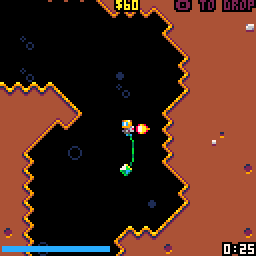
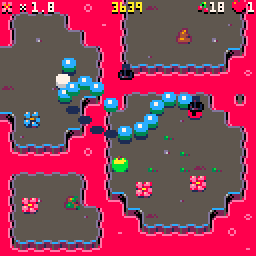
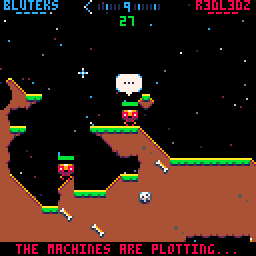
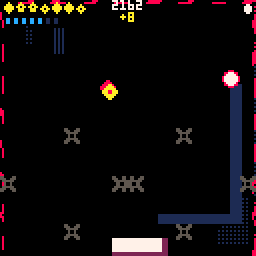
Much like the ZX Spectrum and Commodore 64, the PICO 8 wasn't designed primarily as a platform to simply 'play' games on. Instead, it was designed as a creative tool; a modern day, 8-Bit computer on which the user can build all aspects of a game (or other software) from within a single, integrated development environment. Much has already been written about the innovative design of Lexaloffle's undisputed opus; the cross platform support, the distribution of games within small .png 'cartridge' images, the well thought-out interface and LUA script-based programming language, and of course, the fact that all software developed on it is open source and editable.
But, I'll be frank; none of that really excites me. What does gets my juices flowing, however, is that this zany little 'virtual' computer features a whole load of exclusive, cute little games created by a community of both newcomers and well-established indie developers and artists.
Of course, 8-Bit game development isn't a new phenomenon. The ZX Spectrum, Commodore 64, Atari 800 and even Amstrad CPC homebrew gaming scenes are still active, with dozens of new games released over the past few years for these vintage machines. However, the rate at which the PICO 8 library has grown over the same period is quite astonishing - especially when you consider that it isn't actually a real-life, physical computer that you can actually buy. Or so you might initially think.
In a way, the PICO 8 has already seen a couple of official 'physical' releases; the Chip and Pocket Chip both come with a PICO 8 licence and the software pre-installed. However, if you have a Raspberry pi sitting around in a drawer then you can actually make your own dedicated PICO 8 machine yourself. This rather excellent guide by gamaral explains how to do it (the process of preparing the card takes all of five minutes).
If you've not got a Raspberry Pi, then visit a site such as the Pi Hut and grab one. You'll need the following for the ultimate PICOPi experience:
- A Raspberry Pi (ideally revision 2 or three), power supply and video lead (~£40).
- A case for it (~£6).
- A USB keyboard and mouse (you have these already, surely?)
- At least one USB gamepad (some games support up to 4 players). Xbox 360 style pads work fine, or you can go retro if you prefer (~£5-£30).
- A Micro SD card. PICO 8 requires a tiny amount of space, so if you have a spare small-capacity card, that'll do just fine (~£9).
- A PICO 8 licence ($15).
(Of course, if you don't have any of this stuff then there are bundles available for this sort of project, like this one for £65). In all, you end up with a fully functional computer system for less than £100 that you can play and develop games on. And if you want a break from PICO 8, then you can simply pop in another SD card with another OS or setup on it. It's awesome.
After refitting a spare Pi here with PICO 8 and seeing my kids have a crazy amount of fun with it, I realised that this fantasy console really was the modern day equivalent of those home computers my generation grew up with. It's so simple; plug it in and they are playing games in seconds. With it's in-built, joypad controlled game browser, even my youngest can find his favourites with ease.
Sure, with only 32KB set aside in the header of a .png file to hold all the game data, most releases on the PICO 8 are quite basic, but there are enough notable exceptions to make it worth investigating further. As with our own 16KB cartridge game compo, the strict limitations of the PICO 8 have resulted in some incredible achievements, way beyond the scope of what was initially thought possible.

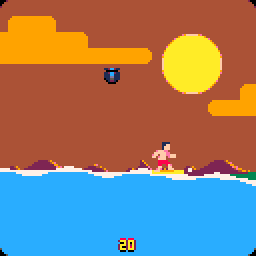
So, now my two boys have one to share, tucked away under the TV in the lounge, and my daughter has her own one which I am hoping she'll learn to program on herself (thanks to a recent Kickstarter project). Hell, even I am tempted to tap out a few lines of code on the thing.
Anyway, enough of the hard sell. What I've been getting to here of course is that as there's so much cool stuff coming out on the PICO 8, I'm genuinely excited about sharing some of my favourites with you. So, as RGCD slowly picks up momentum again, I'll be dropping occasional news and reviews here for what is fast-becoming one of my favourite retro platforms.
In the meantime, have a go at some of these as way of an introduction (all playable within a browser via the PICO 8 BBS!)
- Ad Astra (Ate Bit) (Demo)
- Invader Overload (MorningToast) (Game)
- Marbles 2 (Lucatron) (Game)
- Matchy Matchy (iLKke) (Game)
- Micro Murder (Tic Tac Toad) (Game)
- Mistigri (Benjamin Soulé) (Game)
- Nano Man (FunFetched) (Game)
- Pakutto Boy (Konimiru) (Game)
- Pico Racer (Kometbomb) (Game)
- Spaceman 8 (Tic Tac Toad) (Game)
- Succer (Reload) (Game)
- The Lair (Krajzeg) (Game)
- Wizards Rule (Gadzooka) (Game)
- Worm Nom Nom (Tic Tac Toad) (Game)
- Zepton (Rez) (Game)
More news soon!




No comments:
Post a Comment